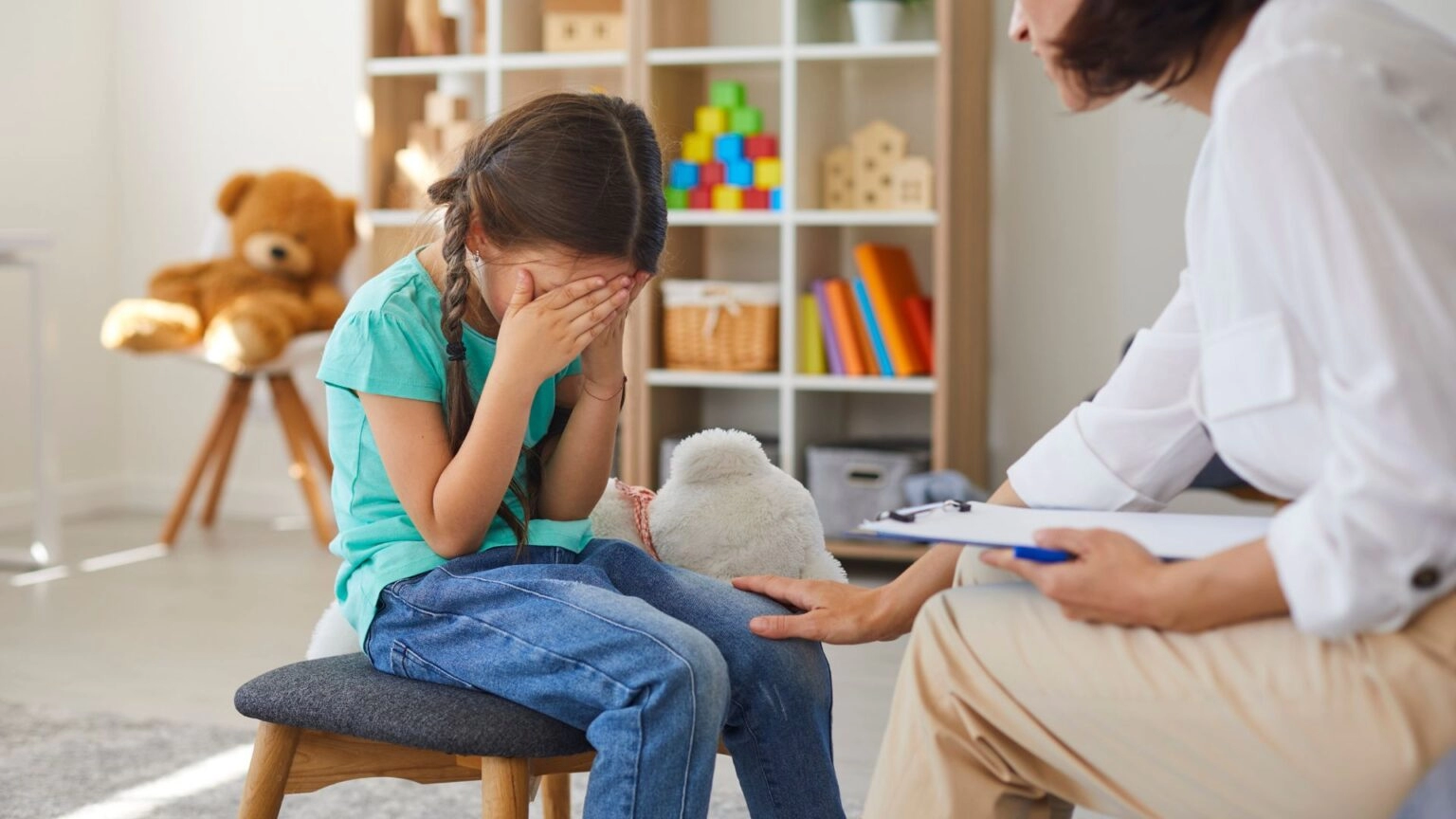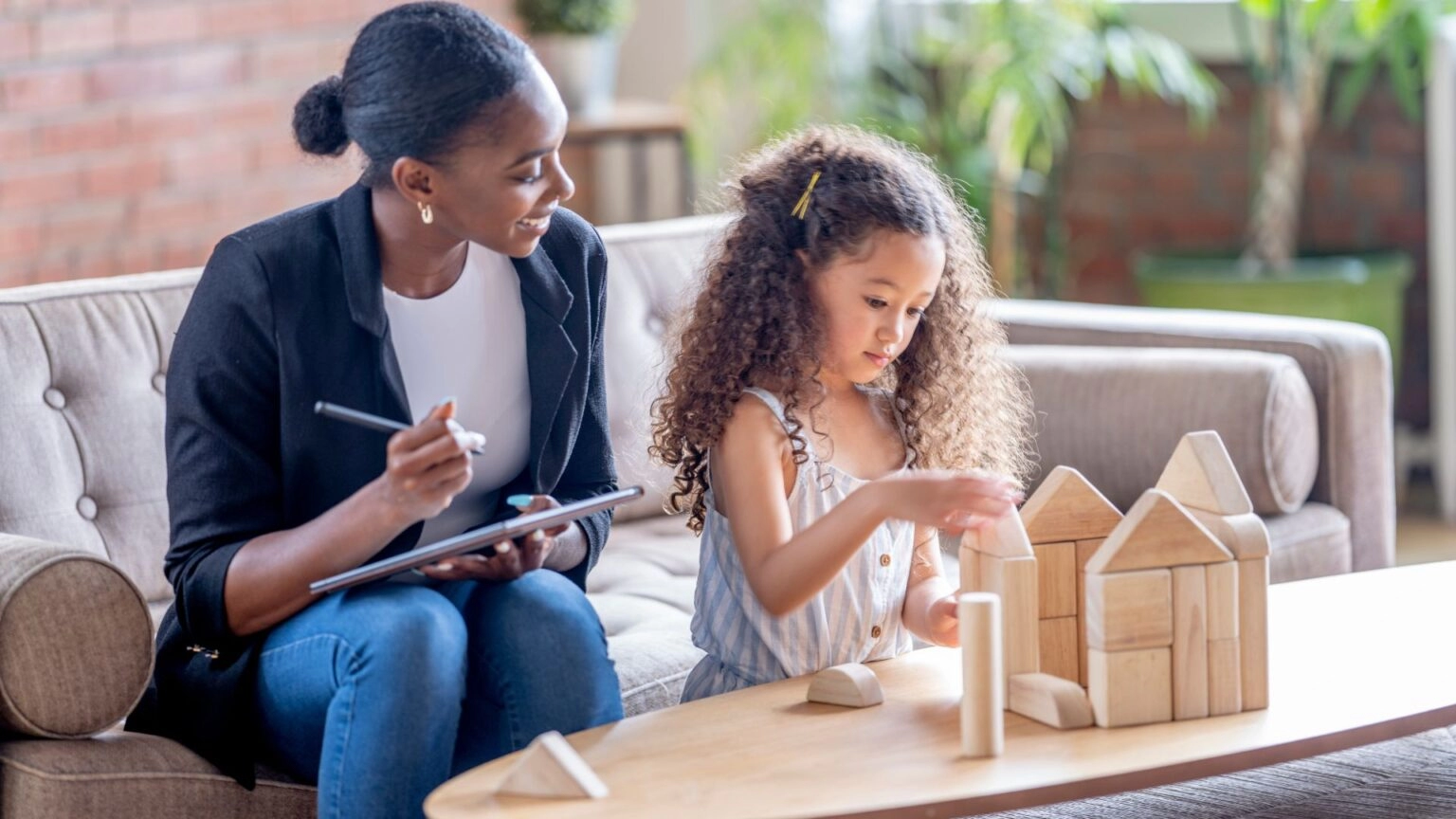We recognize how difficult it is for children to cope with grief, and Child Counselling Therapy in Oakville offers the support they need. Our compassionate approach creates a safe space where kids can express their feelings and learn to navigate their emotions. We utilize techniques like play therapy and cognitive-behavioral therapy to help them process their grief, build resilience, and communicate effectively. Family involvement is emphasized, aiding in deeper connections and understanding. Together, we can help your child on their healing journey. There’s so much more to explore about how we can support grieving children in our community.

About Child Counselling Therapy
Child counselling therapy is a compassionate approach that helps children navigate their feelings and cope with the complex emotions tied to grief. Through effective grief counselling, we provide a safe space for children to express themselves, fostering emotional support in families. Working with a skilled child and adolescent counsellor, we engage in therapeutic interventions that are tailored to each child’s unique needs.
Incorporating trauma-informed therapy techniques, we guarantee that our approach acknowledges the impacts of trauma while promoting healing. This can include behavioral therapy strategies that help children manage their emotions and behaviors more effectively. Parent-child therapy sessions are also crucial, as they strengthen the family bond and enhance communication during difficult times.
Moreover, we encourage families to participate in family support programs that offer community resources and connections. By focusing on family emotional well-being, we aim to create a nurturing environment where children can thrive despite their grief. Together, we can help children find resilience, fostering hope and healing as they learn to cope with loss. Our goal is to empower families to support one another through this challenging journey, guaranteeing that no one feels alone in their grief.
Understanding How Grief Affects Children
Grief profoundly impacts children, shaping their emotional and behavioral responses in ways that can be difficult for them to articulate. It often manifests as anxiety in children, making them feel overwhelmed and uncertain. As we navigate this journey, it is crucial to recognize that grief in children isn’t linear; they may swing between sadness, anger, and even moments of joy.
Through child counselling therapy, we can help them develop emotional resilience, equipping them with tools to process their feelings. Our therapeutic counselling approaches focus on fostering communication skills therapy, allowing children to express their emotions more effectively. We must also consider the family dynamics at play, as the grief experience can ripple through the entire family unit.
Incorporating holistic therapy approaches, we can address the mental health of both the child and the family, ensuring that everyone’s needs are met. Crisis intervention therapy may be necessary for those experiencing intense grief responses, providing immediate support and guidance. By understanding how grief affects children, we can create a nurturing environment that promotes healing and recovery. Together, we can support our children through this challenging time.

How Child Therapy Supports Grief Recovery
In times of loss, therapy can be an essential resource, guiding children through their emotional turmoil and helping them find a path toward healing. Child counselling therapy offers a safe space where kids can express their feelings, learn coping mechanisms, and begin their journey of grief recovery. As emotional resilience specialists, we understand how vital it is to provide tailored support that addresses each child’s unique needs.
Working closely with a mental health professional, we can explore various emotional therapy techniques that resonate with the child. This approach nurtures their ability to cope with loss while also fostering overall emotional health. Additionally, therapy for family issues can enhance the family dynamic, ensuring that parents receive the guidance they need to support their grieving child effectively.
Through holistic family therapy, we can create an environment where everyone feels heard and understood. Our goal is to empower children and their families, equipping them with the tools necessary for healing. With child grief support, we can collectively navigate the complexities of loss, establishing a foundation for lasting emotional resilience and healthier family bonds. Together, we can transform grief into an opportunity for growth and connection.
Using Play Therapy to Help Children Process Grief
Utilizing play therapy can help children work through their feelings of loss in a gentle and engaging way. This approach allows them to express their grief and emotions in a safe environment, fostering emotional regulation. Through play, children can explore their feelings and experiences, which might otherwise be difficult for them to articulate.
In our child counselling therapy sessions, we create a space where children can use toys, art, and storytelling to process their grief. This method not only alleviates anxiety symptoms but also promotes overall mental wellness. By engaging in play therapy, children develop effective anxiety coping strategies that can aid in managing stress and trauma.
As we support family mental health, we recognize the importance of involving caregivers in the process. By understanding how their child is coping with grief through play, families can foster deeper connections and open lines of communication. Ultimately, play therapy serves as an essential tool for children handling grief, allowing them to heal while learning crucial skills for emotional expression and resilience. Together, we can help children embrace their feelings and commence on a journey toward healing.

Cognitive-Behavioral Therapy for Children Facing Grief
As we continue to support children coping with loss, incorporating Cognitive-Behavioral Therapy (CBT) offers a structured way to help them understand and manage their emotions. This form of psychological therapy focuses on changing negative thought patterns that often accompany grief, which can be essential for children’s mental health. Through CBT, children learn effective stress management techniques, allowing them to better navigate their feelings of anxiety and sadness.
In our sessions, we utilize family therapy techniques to engage parents and caregivers, fostering a supportive environment where the child feels safe to express themselves. By addressing relationship dynamics, we help families communicate openly, which enhances emotional well-being for everyone involved.
Participating in anxiety support groups can also be beneficial, as children realize they aren’t alone in their grief. These groups provide a sense of community and understanding, reinforcing the lessons learned in CBT. Ultimately, our goal is to equip children with the tools they need to confront their grief, ensuring they can grow and heal in a healthy way. Through this approach, we empower them on their journey toward recovery and emotional resilience.
Art Therapy for Children Navigating Loss
Art therapy provides a creative outlet for children managing loss, helping them express complex emotions in a safe and supportive environment. Through art therapy for children, we can facilitate grief counseling that allows them to explore their feelings without the pressure of verbal communication. This approach promotes emotional expression in children, making it easier to navigate their grief.
In our family therapy sessions, we encourage the use of various artistic mediums—like drawing, painting, and sculpting—as effective creative coping strategies. These activities help children articulate their experiences and emotions surrounding loss. By incorporating trauma-informed care principles, we make certain that our methods are sensitive to each child’s unique situation.
Moreover, fostering mental health awareness among families during these sessions can empower parents and caregivers to support their children better. As we engage in art therapy, we recognize that this creative process is not just about art; it’s a crucial part of child counselling therapy that nurtures adolescent mental health. Together, we can guide children through their grief journey, using art as a bridge to deeper understanding and healing.
Applying Trauma-Informed Care in Child Grief Therapy
Applying trauma-informed care in child grief therapy guarantees that we create a safe and supportive environment where children can process their emotions and experiences related to loss. In this therapeutic space, we recognize the impact of trauma and prioritize the child’s emotional well-being. This approach allows us to effectively address anxiety in families, providing the necessary emotional support for children managing their grief.
By incorporating anxiety management techniques, we help children develop coping strategies for grief that are tailored to their unique needs. Our commitment to trauma-informed care enhances the family therapy process, ensuring that families feel included and supported throughout their journey. This holistic approach emphasizes the importance of mental health care for children, fostering resilience and healing.
In addition, we utilize psychotherapy for anxiety when needed, allowing us to address any underlying concerns that might arise. By creating a nurturing environment, we empower children to express their feelings openly, paving the way for healing and growth. Through this compassionate framework, we’re not only helping children cope with their grief but also equipping families with the tools they need to manage their emotional landscape together.
The Significance of Emotional Support for Children in Grief
Providing emotional support for children managing grief is crucial, as it helps them feel understood and less isolated during a profoundly challenging time. When we engage in family counselling therapy, we create a safe space for children to express their feelings. This emotional support not only aids in processing grief but also strengthens family relationship building.
Through child counselling, we can equip ourselves with effective parenting strategies that address both grief and anxiety. By using an anxiety symptoms checklist, we can identify signs that may indicate a child is struggling, allowing us to respond with compassion and care. It’s important to remember that grief can manifest in various ways, and our support can make a significant difference.
Moreover, implementing conflict resolution in families can help us navigate the complexities of emotions that arise during this time. By fostering open communication, we encourage children to share their feelings and fears without judgement. Together, we can guarantee that family mental health care remains a priority, allowing our children to heal and grow. Ultimately, the emotional support we provide today lays the foundation for their resilience tomorrow.
Parent-Child Therapy as a Tool for Navigating Grief
Parent-child therapy often serves as an important resource for families traversing the complexities of grief together. This form of family counselling therapy allows us to explore our emotions in a supportive environment, guided by a licensed counsellor who understands the nuances of grief therapy. Through parent-child therapy, we can create open lines of communication, fostering a safe space for our children to express their feelings.
Integrative family therapy approaches can be particularly effective, as they address the unique dynamics within our families. By participating in marriage and family therapy, we not only support our children but also strengthen our bonds as a family unit. This journey toward family healing is essential, as it encourages emotional support for children during one of the toughest times in their lives.
We can also learn important family communication therapy skills, enabling us to better understand each other’s grief experiences. Child grief counseling is significant, helping our little ones process loss while ensuring we, as parents, are equipped to support them. Together, we can navigate grief and emerge stronger, unified by our shared experiences and understanding.
Incorporating School Counseling into Child Grief Support
Incorporating school counseling into child grief support can create an important safety net for our children, helping them navigate their emotions while fostering resilience in the face of loss. School counselors play a significant role in providing mental health support, offering a safe space for kids to express their feelings and work through grief.
These professionals can collaborate with parents and relationship counsellors to guarantee that our children receive thorough care. By integrating child counselling into the school environment, we can help reduce anxiety in adults who may worry about their child’s coping mechanisms. School counseling not only addresses grief but also provides tools for managing anxiety through targeted anxiety therapy sessions.
Moreover, when we incorporate family counselling therapy into our children’s education, we promote a holistic approach to family health counselling. This collaboration can strengthen the bonds between parents and children, allowing families to heal together. By prioritizing grief support in schools, we’re not just aiding our children in their emotional journey; we’re also setting the foundation for healthier relationships and emotional resilience as they grow. Together, we can create a supportive community that nurtures the well-being of our children during challenging times.
Family Therapy's Role in the Grief Recovery Process
Family therapy can be an essential lifeline for families steering through the turbulent waters of grief, helping us reconnect and heal together during such a challenging time. Engaging in family counselling therapy allows us to explore our feelings, fostering emotional support for families who may feel isolated in their grief. A marriage and family therapist can guide us through the grief recovery process, emphasizing the importance of open communication and understanding.
Through family systems therapy, we can identify patterns that may contribute to family conflict management, making sure everyone’s voice is heard. This approach is particularly beneficial for children, as it provides targeted children’s grief support, helping them articulate their emotions in a safe environment.
Moreover, family therapy can also address underlying anxiety treatment needs, which may arise during the grieving process. By collaborating with a skilled psychotherapist, we can navigate our grief collectively, strengthening our familial bonds. Utilizing child counselling services guarantees that our children receive the specialized support they need, enabling us all to move forward together. Ultimately, family therapy serves as a fundamental component in our shared journey toward healing and recovery.
The Impact of Early Intervention on Managing Grief
How can early intervention make a significant difference in managing grief for children and families alike? By addressing grief through child counselling therapy soon after a loss, we can foster resilience and emotional healing in our young ones. Early intervention allows us to provide essential emotional support, helping children process their feelings in a safe environment.
When we engage in family counselling services, we create a supportive space for everyone affected by the loss. This family-focused therapy can alleviate anxiety disorders in teens, which often arise from unresolved grief. Through stress reduction techniques and calming strategies, we empower children to express their emotions healthily.
Moreover, exploring anxiety treatment options during this vital time can lead to better coping mechanisms, ensuring that both children and their families can navigate their grief together. We all benefit when we prioritize early intervention; it not only helps us understand the journey of grief but also strengthens our bonds as a family. Together, we can transform a painful experience into an opportunity for growth, healing, and connection.
Effective Grief Counseling Techniques for Children
Effective grief counseling techniques for children often involve creative approaches that allow them to express their emotions in ways that feel safe and natural. Through family counseling therapy, we can help children navigate their feelings of loss while fostering family wellness. Art and play therapy are indispensable tools; they enable kids to communicate their grief non-verbally, which is often more comfortable for them.
Employing anxiety reduction techniques, we can help children manage overwhelming feelings. A cognitive-behavioral therapist can guide them in understanding their emotions and developing emotional regulation skills. This approach not only benefits the child but also provides essential support for parents.
Child therapy sessions can incorporate family guidance services, ensuring that everyone in the family is on the same page during this challenging time. We recognize that grief can affect family dynamics, so couples and family therapy can also play a role in healing and connection.
Support Strategies and Coping Mechanisms for Grieving Families
Steering through grief together can feel intimidating, but there are compassionate strategies and coping mechanisms that can help us support one another through this difficult journey. Family counselling therapy offers a safe space for us to express our feelings and navigate the complexities of loss and bereavement. We can explore grief support strategies that address not just our emotional needs but also the anxiety and depression that often accompany grief.
Incorporating grounding techniques can help us stay present, while relaxation exercises provide moments of stress relief. These coping mechanisms for grieving families can foster a sense of connection and understanding. We can also engage in children’s grief therapy, ensuring our kids have the tools to express their feelings and cope with their loss.
Contact Our Child Therapists for Comprehensive Grief and Anxiety Support in Oakville
If you’re seeking compassionate support for your child’s grief and anxiety, our dedicated child therapists in Oakville are here to help. We recognize that maneuvering through these emotional challenges can be overwhelming for both children and families. That’s why we offer specialized child counselling therapy aimed at providing effective grief support and anxiety relief.
At our Child Counselling Therapy Center in Oakville, our skilled anxiety therapists are dedicated to providing a secure environment where your child can freely express their feelings. Our personalized anxiety counselling sessions are designed to equip children with effective coping strategies, significantly enhancing their mental well-being. We also emphasize the importance of family involvement, recognizing that a supportive network is crucial for the healing process. Our family therapists collaborate with you to ensure a comprehensive approach to your child’s emotional support.
We are committed to helping every child heal and thrive. By connecting with our child therapists in Oakville, you are taking a vital step toward assisting your child in managing their grief and anxiety. Together, we can build resilience and emotional health, guiding your child towards a more hopeful and positive future. Let’s embark on this journey of healing together.

About Town of Oakville
What makes Oakville such a nurturing community for families seeking support is its blend of vibrant parks, engaging cultural activities, and a strong network of compassionate services. Here, in Oakville, Ontario, we find a community that truly cares about mental health and emotional support. Families dealing with grief, especially those with children, can access various resources, including family counselling therapy and specialized child therapy.
In our town, family therapists are dedicated to guiding us through the healing process after a loss. They understand that grieving is not just for adults; children experience grief too, and they need tailored support. Our local therapists provide a safe environment for children to express their feelings, helping them navigate their emotions during difficult times.
As we come together, we can foster resilience and hope. The warm, supportive atmosphere in Oakville allows families to connect, share experiences, and find comfort in knowing they are not alone. Whether through community events, support groups, or one-on-one therapy, we have the tools to help our children heal and grow, ensuring they feel embraced and understood during their journey through grief.

- Dundas Street (Highway 5)
- Trafalgar Road
- Lakeshore Road
- Speers Road
- Third Line
- Upper Middle Road
- Bronte Road
- Royal Windsor Drive
- Winston Churchill Boulevard
- Ford Drive
- Dorval Drive
- Rebecca Street
- Great Lakes Boulevard
- 16 Mile Drive
- QEW (Queen Elizabeth Way)
- North Service Road
- South Service Road
- Maple Grove Drive
- Burnhamthorpe Road
- Glenashton Drive
- West Oakville
- Falgarwood
- Kerr Village
- Clearview
- West Oak Trails
- Bronte
- Palermo
- Ennisclare Park
- Glen Abbey
- Uptown Core
- Oakville East L6K
- Oakville South L6L
- Oakville North L6H
- Oakville West L6M
- Oakville Northeast L6J
Frequently Asked Questions
What Age Groups Benefit Most From Child Grief Counseling in Oakville?
When we think about grief counseling for children, it’s clear that different age groups respond in unique ways. Generally, we see younger children, around ages 5 to 10, benefit greatly from play therapy, as it helps them process emotions. Meanwhile, older kids, particularly tweens and teens, often engage in more direct conversations about their feelings. Ultimately, every age group can gain valuable support, but the approach may vary to suit their developmental needs.
How Can Parents Recognize Signs of Grief in Their Child?
Recognizing signs of grief in our child can be challenging but essential. We might notice changes in their behavior, like increased irritability, withdrawal, or changes in sleep patterns. They may express sadness or have difficulty concentrating. It’s important to pay attention to their emotional state and any sudden shifts in their interests. By staying connected and open, we can create a safe space for them to share their feelings and help guide them through this tough time.
Are There Specific Grief Resources Available for Oakville Families?
There’re definitely specific grief resources available for families in Oakville. We can find support through local organizations, community centers, and online platforms that offer grief counseling and workshops. Many of these resources are tailored for families, ensuring we have the tools we need to navigate this challenging time together. It’s important to reach out and connect with these resources, as they can provide the understanding and support we all deserve.
What Should I Expect During a Child Grief Therapy Session?
When we attend a child grief therapy session, we can expect a safe and supportive environment where our child can express their feelings openly. The therapist will guide discussions, using play or art to help our child communicate emotions. We’ll be encouraged to participate, fostering trust and understanding. It’s a space for healing, where we can learn coping strategies together, ensuring our child’s grief journey is acknowledged and supported compassionately.
How Long Does Child Grief Counseling Typically Last?
When it comes to child grief counseling, we can expect the duration to vary depending on each child’s needs. Typically, sessions might last anywhere from a few weeks to several months. We’re all unique, and some may find comfort and healing more quickly than others. It’s essential for us to stay patient and supportive, allowing our child the time they need to process their feelings and experiences in a safe environment.
